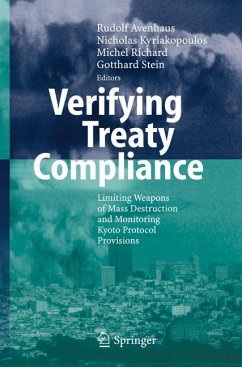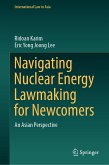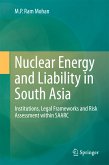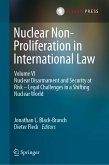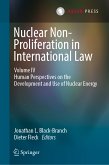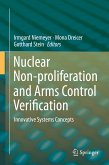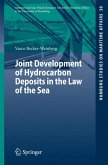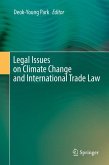Verifying Treaty Compliance (eBook, PDF)
Limiting Weapons of Mass Destruction and Monitoring Kyoto Protocol Provisions
Redaktion: Avenhaus, Rudolf; Stein, Gotthard; Richard, Michel; Kyriakopoulos, Nicholas
161,95 €
161,95 €
inkl. MwSt.
Sofort per Download lieferbar

81 °P sammeln
161,95 €
Als Download kaufen

161,95 €
inkl. MwSt.
Sofort per Download lieferbar

81 °P sammeln
Jetzt verschenken
Alle Infos zum eBook verschenken
161,95 €
inkl. MwSt.
Sofort per Download lieferbar
Alle Infos zum eBook verschenken

81 °P sammeln
Verifying Treaty Compliance (eBook, PDF)
Limiting Weapons of Mass Destruction and Monitoring Kyoto Protocol Provisions
Redaktion: Avenhaus, Rudolf; Stein, Gotthard; Richard, Michel; Kyriakopoulos, Nicholas
- Format: PDF
- Merkliste
- Auf die Merkliste
- Bewerten Bewerten
- Teilen
- Produkt teilen
- Produkterinnerung
- Produkterinnerung

Bitte loggen Sie sich zunächst in Ihr Kundenkonto ein oder registrieren Sie sich bei
bücher.de, um das eBook-Abo tolino select nutzen zu können.
Hier können Sie sich einloggen
Hier können Sie sich einloggen
Sie sind bereits eingeloggt. Klicken Sie auf 2. tolino select Abo, um fortzufahren.

Bitte loggen Sie sich zunächst in Ihr Kundenkonto ein oder registrieren Sie sich bei bücher.de, um das eBook-Abo tolino select nutzen zu können.
This book presents an interdisciplinary collection of expert analyses and views of existing verification systems. It provides guidelines and advice for the improvement of those systems as well as for new challenges in the field.
- Geräte: PC
- ohne Kopierschutz
- eBook Hilfe
- Größe: 9.99MB
Andere Kunden interessierten sich auch für
![Navigating Nuclear Energy Lawmaking for Newcomers (eBook, PDF) Navigating Nuclear Energy Lawmaking for Newcomers (eBook, PDF)]() Ridoan KarimNavigating Nuclear Energy Lawmaking for Newcomers (eBook, PDF)113,95 €
Ridoan KarimNavigating Nuclear Energy Lawmaking for Newcomers (eBook, PDF)113,95 €![Nuclear Energy and Liability in South Asia (eBook, PDF) Nuclear Energy and Liability in South Asia (eBook, PDF)]() M. P. Ram MohanNuclear Energy and Liability in South Asia (eBook, PDF)40,95 €
M. P. Ram MohanNuclear Energy and Liability in South Asia (eBook, PDF)40,95 €![Nuclear Non-Proliferation in International Law - Volume VI (eBook, PDF) Nuclear Non-Proliferation in International Law - Volume VI (eBook, PDF)]() Nuclear Non-Proliferation in International Law - Volume VI (eBook, PDF)89,95 €
Nuclear Non-Proliferation in International Law - Volume VI (eBook, PDF)89,95 €![Nuclear Non-Proliferation in International Law - Volume IV (eBook, PDF) Nuclear Non-Proliferation in International Law - Volume IV (eBook, PDF)]() Nuclear Non-Proliferation in International Law - Volume IV (eBook, PDF)137,95 €
Nuclear Non-Proliferation in International Law - Volume IV (eBook, PDF)137,95 €![Nuclear Non-proliferation and Arms Control Verification (eBook, PDF) Nuclear Non-proliferation and Arms Control Verification (eBook, PDF)]() Nuclear Non-proliferation and Arms Control Verification (eBook, PDF)137,95 €
Nuclear Non-proliferation and Arms Control Verification (eBook, PDF)137,95 €![Joint Development of Hydrocarbon Deposits in the Law of the Sea (eBook, PDF) Joint Development of Hydrocarbon Deposits in the Law of the Sea (eBook, PDF)]() Vasco Becker-WeinbergJoint Development of Hydrocarbon Deposits in the Law of the Sea (eBook, PDF)73,95 €
Vasco Becker-WeinbergJoint Development of Hydrocarbon Deposits in the Law of the Sea (eBook, PDF)73,95 €![Legal Issues on Climate Change and International Trade Law (eBook, PDF) Legal Issues on Climate Change and International Trade Law (eBook, PDF)]() Legal Issues on Climate Change and International Trade Law (eBook, PDF)73,95 €
Legal Issues on Climate Change and International Trade Law (eBook, PDF)73,95 €-
-
-
This book presents an interdisciplinary collection of expert analyses and views of existing verification systems. It provides guidelines and advice for the improvement of those systems as well as for new challenges in the field.
Dieser Download kann aus rechtlichen Gründen nur mit Rechnungsadresse in A, B, BG, CY, CZ, D, DK, EW, E, FIN, F, GR, HR, H, IRL, I, LT, L, LR, M, NL, PL, P, R, S, SLO, SK ausgeliefert werden.
Produktdetails
- Produktdetails
- Verlag: Springer Berlin Heidelberg
- Seitenzahl: 629
- Erscheinungstermin: 21. April 2007
- Englisch
- ISBN-13: 9783540338543
- Artikelnr.: 37367747
- Verlag: Springer Berlin Heidelberg
- Seitenzahl: 629
- Erscheinungstermin: 21. April 2007
- Englisch
- ISBN-13: 9783540338543
- Artikelnr.: 37367747
- Herstellerkennzeichnung Die Herstellerinformationen sind derzeit nicht verfügbar.
Conceptual Framework.- Conceptual Framework.- Treaties and their Requirements.- Arms Control and Non-Proliferation Treaties: An Ontology of Concepts and Characteristics.- International Atomic Energy Agency Safeguards under the Treaty on the Non-Proliferation of Nuclear Weapons: Challenges in Implementation.- Verification under the Chemical Weapons Convention.- Biological Weapons Convention.- Comprehensive Nuclear-Test-Ban Treaty Verification.- Treaty on Conventional Forces in Europe.- Developing the Climate Change Regime: The Role of Verification.- Field Experience.- Experience and Challenges in Weapons of Mass Destruction Treaty Verification: A Comparative View.- A Concrete Experience: The Iraq Case.- Beyond Iraq: The New Challenges to the Nuclear Non Proliferation Regime.- Formal Models of Verification.- Formal Models of Verification.- Systems and Linkages - Crosscutting.- Civil Reconnaissance Satellites: Opportunities and Challenges.- Change Detection: The Potential for Nuclear Safeguards.- Aspects of Networking: Experience from Global Monitoring for Security and Stability.- Environmental Sample Analysis.- Tracing the Origin of Diverted or Stolen Nuclear Material through Nuclear Forensic Investigations.- Information Collection and Analysis.- The Information Infrastructure of a Treaty Monitoring System.- The International Level.- Open Source Information Collection, Processing and Applications.- The National Level.- Emerging Verification Technologies.- Advanced Sensor Technologies.- Monitoring Reactors with Cubic Meter Scale Antineutrino Detectors.- Digital Verification Techniques in the Nuclear Safeguards System: Status and Perspectives.- Emerging Verification Technologies.- A Sustainable Approach for Developing Treaty Enforcement Instrumentation.- Perspectives and Conclusions.- Continuity and Change in International Verification Regimes.- Improving Verification: Trends and Perspectives for Research.- Concluding Remarks.
Conceptual Framework.- Conceptual Framework.- Treaties and their Requirements.- Arms Control and Non-Proliferation Treaties: An Ontology of Concepts and Characteristics.- International Atomic Energy Agency Safeguards under the Treaty on the Non-Proliferation of Nuclear Weapons: Challenges in Implementation.- Verification under the Chemical Weapons Convention.- Biological Weapons Convention.- Comprehensive Nuclear-Test-Ban Treaty Verification.- Treaty on Conventional Forces in Europe.- Developing the Climate Change Regime: The Role of Verification.- Field Experience.- Experience and Challenges in Weapons of Mass Destruction Treaty Verification: A Comparative View.- A Concrete Experience: The Iraq Case.- Beyond Iraq: The New Challenges to the Nuclear Non Proliferation Regime.- Formal Models of Verification.- Formal Models of Verification.- Systems and Linkages - Crosscutting.- Civil Reconnaissance Satellites: Opportunities and Challenges.- Change Detection: The Potential for Nuclear Safeguards.- Aspects of Networking: Experience from Global Monitoring for Security and Stability.- Environmental Sample Analysis.- Tracing the Origin of Diverted or Stolen Nuclear Material through Nuclear Forensic Investigations.- Information Collection and Analysis.- The Information Infrastructure of a Treaty Monitoring System.- The International Level.- Open Source Information Collection, Processing and Applications.- The National Level.- Emerging Verification Technologies.- Advanced Sensor Technologies.- Monitoring Reactors with Cubic Meter Scale Antineutrino Detectors.- Digital Verification Techniques in the Nuclear Safeguards System: Status and Perspectives.- Emerging Verification Technologies.- A Sustainable Approach for Developing Treaty Enforcement Instrumentation.- Perspectives and Conclusions.- Continuity and Change in International Verification Regimes.- Improving Verification: Trends and Perspectives for Research.- Concluding Remarks.
